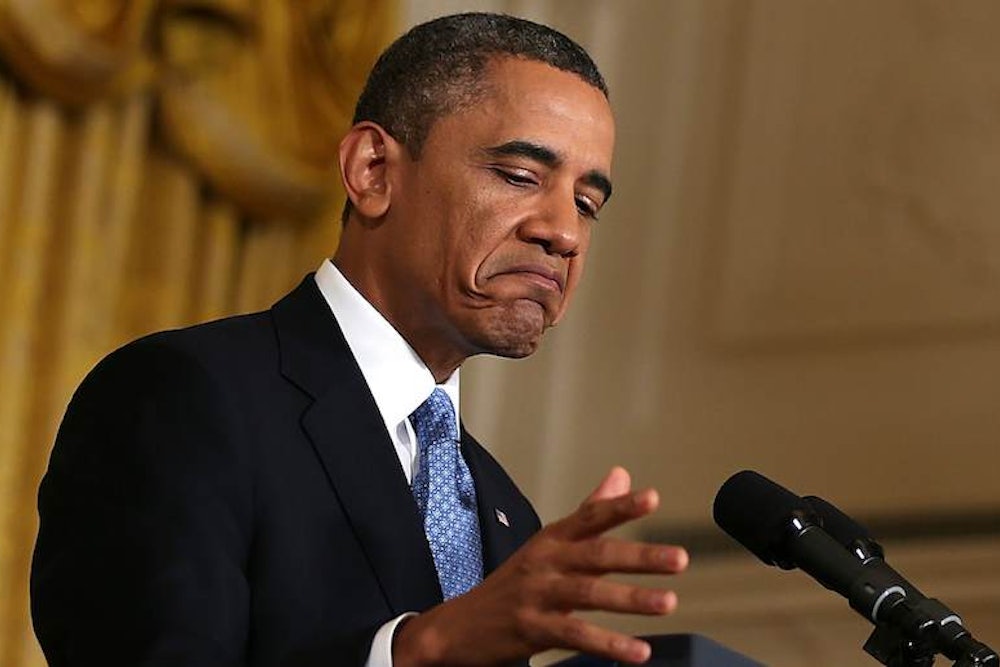How should Obama approach the next installment of our ongoing fiscal groundhog day?
The administration itself appears to be confused on this question. While the White House insists it won’t negotiate over raising the debt ceiling, negotiation appears to be precisely what it’s up to. Politico reports that White House officials are meeting with Republican senators on Thursday to explore a deal that would simultaneously fund the government past the September 30th end of the fiscal year, replace the sequester with a more sane combination of spending cuts and revenue, and raise the debt ceiling before it crushes us in mid-to-late October.
This, to employ a clinical term, is nuts. Whether or not the White House maintains its no-debt-ceiling negotiation stance within these talks, the whole construct throws the GOP a lifeline where none would otherwise exist. After all, the Republican leadership knows it would be suicidal to force a debt-default by refusing to raise the debt ceiling. It also knows that forcing a government shutdown by failing to fund the government past September 30th would be politically disastrous. (John Boehner has said he believes it could cost Republicans their House majority.) But, of course, rank-and-file Republicans in Congress are demanding that their leadership hold the line on at least one, and preferably both, of those issues. The right-wingers want their leadership to balk at keeping the government open unless they can first defund Obamacare, and to resist raising the debt ceiling unless they extract massive additional spending cuts, particularly from entitlement programs.
Boehner’s only hope of navigating the vanishingly small space between his House lunatics and, well, reality is to combine both issues and the sequester into one massive negotiation. In that scenario, Boehner would agree to replace the sequester and to raise the debt ceiling in exchange for cuts to entitlement spending. The logic, as Politico explains it, is that Obama could claim he only negotiated over the sequester, not the debt ceiling (his ostensible red line). For his part, Boehner would be able to claim he won spending cuts in exchange for raising the debt ceiling, allowing him to save face before his caucus. Meanwhile, the deal for replacing the sequester would fund the government during the next fiscal year, defusing the shutdown threat as well.
Long story short: The White House willingness to engage in a multi-issue mega-negotiation plays entirely into Boehner’s hand. It’s basically a strategy designed to maximize Republican leverage and minimize Obama’s. At the very least, the White House should want to keep each track of the negotiation unambiguously separate, forcing Boehner to acknowledge his terrible bargaining position.
But I’d go a bit further and recommend the following: Obama should announce immediately that he’s perfectly happy to negotiate over pretty much any budgetary issue the GOP wants to talk about, but that—and this is the key—he won’t negotiate for a second until Congress raises the debt ceiling. That is, don’t just say you won’t negotiate over the debt ceiling. Make raising the debt ceiling a precondition for any future negotiation.
This strategy is basically pins Boehner against the wall. The debt ceiling doesn’t need to be raised until mid-October at the earliest, and more likely late October or early November. But unless Obama and the GOP agree on a way to fund the government by September 30th, there will be a shut down, a scenario that pretty much everyone agrees would be much more damaging to Republicans. So if Obama insists on raising the debt ceiling as a precondition to avoiding a shutdown, the GOP will face a brutal choice: Either comply and raise the ceiling, taking the issue off the table and allowing Obama to focus entirely on funding the government (thereby giving him even more leverage in that debate). Or the GOP can refuse to raise the debt ceiling, shut down the government after September 30th, and endure the political hell-to-pay for this foolish move. And, of course, the price of being rescued from this quagmire-of-its-own-devising will be raising the debt ceiling, meaning there’s no way the debt-ceiling doesn’t get raised before we move onto the government funding debate.
Simply put: Boehner knows he needs a way out of the looming train-wreck that is a government shutdown (hence his desire to pass a measure that would fund the government for two more months.) Obama must seize on this vulnerability and insist the only way out is to take the debt-ceiling off the table.
It all comes back to a basic principle of negotiating: When you have leverage, it’s in your interest to be as explicit as possible about what you want and don’t want. This makes it hard for the other guy to wriggle out of your demands. It’s only when you don’t have leverage that you want to obscure the terms of the debate. The House Republican leadership clearly understands this. Does Obama?
Noam Scheiber is a senior editor at The New Republic. Follow @noamscheiber
UPDATE: A knowledgeable source says the Politico piece overhypes the nature of the negotiation between the White House and GOP senators, which is still very preliminary and unlikely to affect the outcome of the early fall showdown. This is somewhat reassuring. But the point stands: By keeping the debt-ceiling issue alive and allowing Boehner to mash the various fiscal battles together, the White House cedes leverage that the GOP has no business claiming.
UPDATE 2: Read my response to the strongest objections to this argument here.
